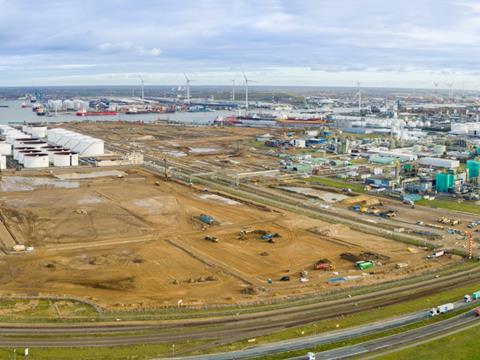
INEOS Olefins Belgium has secured €3.5 billion in funding to support the construction and operation of its Project ONE ethane cracker in the Port of Antwerp, which aims to become the most environmentally sustainable cracker in Europe and produce ethylene; this can in turn be polymerised into polyethylene.
The deal has been supported by 21 commercial banks and comprises €1.5 billion of uncovered debt; €1.2 billion of covered facilities from UKEF, Cesce, and SACE; and €800 million of covered tranche, of which up to €500 million is guaranteed by Gigarant. INEOS will draw the debt in stages and support the project’s spend profile through to completion.
The new cracker is expected to have the lowest carbon footprint of all the crackers in Europe – three times lower than the average European steam cracker and less than half than the footprint of the 10% best performers on the continent, says INEOS. Once it can access enough low-carbon hydrogen, it is hoped to reach a zero-carbon footprint.
It is also set to come with room for a carbon capture facility and electric furnaces, which INEOS hopes to implement in the future. The ethylene produced at the cracker is expected to be applied to plastics for medical, healthcare, and food hygiene, as well as technology for renewable energy and more.
“This is an incredibly important moment for INEOS,” says Jason Meers, CFO INEOS Project One. “Our ethane cracker will set new environmental standards for Europe as well as help revitalize the whole of the European chemical industry.
“Project ONE is a game changer for Europe. It will bring new opportunities to the chemical cluster in Antwerp as well as strengthen the resilience of the whole of the European chemical sector.
“We are thrilled to reach this milestone and secure this funding. Bringing together such a large number of environmentally focused commercial banks alongside four governmental agencies demonstrates the huge importance of the project.”
INEOS Olefins & Polymers Europe’s steam cracker in Köln was announced as the base for the production of 10,000 tonnes of recycled raw materials per annum in an agreement with Plastic Energy. The former also joined the HolyGrail 2.0 initiative last year.
TotalEnergies’ Antwerp-based steam cracker would also supply Berry Global with polymers produced via the chemical recycling of plastic waste in a separate agreement. The polymers were expected to be used in the production of food, beverage, and healthcare packaging.














No comments yet